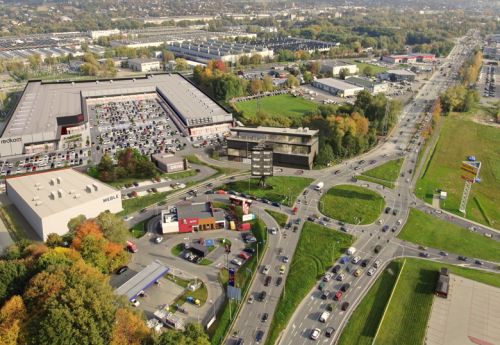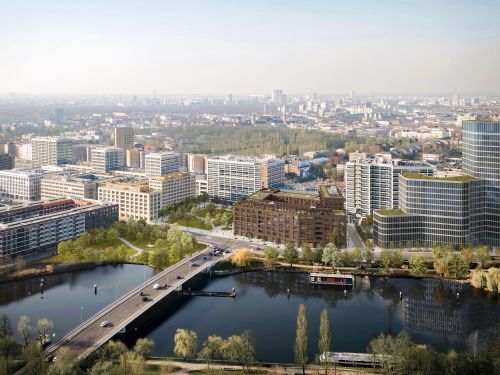The big pay off
Human resources
The job market in the property sector is linked to the number of projects being carried out by developers. The need for new staff is mostly generated by their activities. Market analysts are not expecting to see a spectacular increase in the number of employees; however, the market should gradually expand. Employers’ requirements are changing as they are already looking for qualified staff.
Where are we – and where will we be?
The state of the real estate sector could be assessed in a number ways. One is through the prism of the job market. Whether the business will develop and in which direction can be deduced by observing developers’ plans for taking new staff. The current situation seems to be stable in this respect. “The job market in the sector looks good at this time.
It is certainly better than in 2010 and 2011. You could say that 2012 was the start of the best time since the beginning of the crisis, but of course worse than the best years of 2006 and 2007,” remarks Oskar Kasiński, the head of the construction and real estate department at recruitment company Cpl Jobs. In which respects does the market look better? “Our clients, who are mostly commercial developers, have announced plans to grow and are looking for new people to work for them. There are more and more new recruitment drives and nothing suggests that this is going to change. On the contrary – the market has revived,” insists Oskar Kasiński. This translates into the number of personnel employed by companies. “SwedeCenter has recently been intensively recruiting for the number of projects it has planned. We were mostly looking for people to fill in project management jobs and for office space commercialisation. Over the last three years the staffing level in the company increased from 24 to 45,” says Ewa Łydkowska, the head of marketing at SwedeCenter. Mark Twomey, a real estate market recruiter and the managing partner of Tara HR Consultants, concurs. “There are a lot of new projects in the office sector. But this does not only apply to Warsaw. The office space market in the capital city has become rather saturated, which is why the role of regional cities, such as Kraków, Poznań, Wrocław, Szczecin and the TriCity, has been growing,” he explains. Developers have also been quick to identify the smaller towns and cities on the retail market where retail parks and smaller convenience shopping centres could be built. “Developers are focusing on extensions, redevelopments of their facilities and projects in smaller towns. The regional market is the main beneficiary of such projects,” Oskar Kasiński points out. Rank Progress, which is carrying out a substantial number of retail projects in smaller towns, stresses the influence this has on the local job market. “Each new project generates new jobs. A shopping centre needs large numbers of staff, both in terms of the stores of their tenants, customer services and to ensure the effective functioning of the centre itself. With each new project we recruit people for the administration, marketing and technical servicing of the facility,” claims Łukasz Gruszczyński, the marketing director of Rank Progress.
Desperately seeking specialists
The types of employees currently sought reflects the current healthy growth of the real estate market. Unsurprisingly, this is a good time for green solutions specialists. “People with additional skills, courses and qualifications are in demand, such as building certification specialists, BREEAM and LEED assessors and, importantly, people with some experience in terms of the construction and lease of ecological projects. Until fairly recently it was not easy to find such an employee, particularly for the top positions. We carried out a project like this last year. Only five or six people throughout Poland had the required qualifications. But as the trend gathers pace, so more and more people are opting for training in this field,” states Oskar Kasiński. The general requirements, however, have changed: experience and languages. “People are increasingly often being required to speak other languages, such as German or French, on top of the English that is the basis of any recruitment and an absolute requirement. Being an RICS certificate holder is an advantage when applying for some positions, such as those connected with valuation and project profitability analysis. Any additional qualifications, for example MBA studies or postgraduate studies in the preferred field, also add value,” comments Oskar Kasiński. And is there anything else that employers are looking for? “Employees specialising in the individual stages of office building construction are also much sought after. There is also great demand for people involved in leasing, as this has probably reached a record high over the last twelve months. Among the other specialists in demand are office property managers and asset managers, who are needed by the funds present on the market and those which are just about to enter the market as a result of planned transactions,” adds Mark Twomey.
More than money
Money is not everything, but it would be difficult not to mention it in the course of recruitment. Talks concerning concrete amounts and candidates’ expectations regarding their future salaries always come up at a certain stage. The people who were employed in the times before the slowdown and are now looking for new jobs must adjust their financial expectations. The rates offered by developers have decreased considerably. “Only a few years ago a mid-level manager earned an average PLN 15,000 gross. Now the amounts start at PLN 8,000 per month,” remarks Oskar Kasiński. According to the ‘Payroll Report for July–December 2012’ drawn up by Cpl Jobs, the average monthly salary of a shopping centre manager in Warsaw ranges from PLN 8,000 to PLN 15,000 per month, whereas in Wrocław, Łódź and Gdańsk it is between PLN 7,000 and PLN 13,000. A property manager in Warsaw can count on PLN 8,000 to PLN 16,000 and a leasing manager on PLN 12,000 to PLN 25,000. Meanwhile, the monthly remuneration of the manager of a retail chain developer ranges between PLN 10,000 and PLN 20,000, while on the regional market it is between PLN 10,000 and PLN 15,000. Recruitment firm PropertyTalents offers slightly different data. According to its ‘PropertyTalents Salary Survey’, the average monthly salary for the managers of retail real estate firms amounts to app. PLN 18,900. Employees of asset management companies earn slightly less – PLN 17,800 according to the report. Employees of facility management companies earn the least, with a gross monthly salary of PLN 8,500. As far as positions are concerned, the highest salaries are offered to managing directors, or owners (PLN 34,800). Department directors’ salaries are around PLN 24,500, while team leaders earn PLN 15,000 gross per month. Interestingly, the average monthly salary for the managers of Polish commercial real estate firms in terms of gender is as follows: PLN 17,900 for men and PLN 14,900 for women. The average annual bonus for women amounted to PLN 45,400 gross, while for men it was PLN 67,500. “It is important that the salary is not the only factor considered by real estate sector employees when changing their employer – this was true of only 44.1 pct of the respondents. Almost 71 pct care most about career development prospects, while the management style and the corporate culture are the most important for 34.7 pct of them,” explains Alexander Morari, the managing partner of PropertyTalents. However, the strongest incentive is the opportunity to work on a prestigious project for a well-established company with an interesting project portfolio.





















































